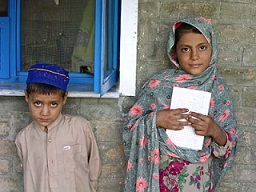KARACHI – A leading Islamic foundation in Pakistan has launched a program to provide shelter, food and education to thousands of children who have lost their parents in natural calamities in the south Asian Muslim country.
“We had been planning to launch this project for last five years but because of some unavoidable reasons we could not do that,” Ejazullah Khan, the national director of Al-Khidmat Foundation told OnIslam.net.
“We are thankful to Allah who has enabled us to launch this project in order o patronize those children who have lost their parents.”
The much-awaited program has been divided into two parts – Aghosh (protection), and Kifalah (support). The Aghosh or protection project is meant for children who have lost their parents, and have no other family member to take care of them.
“These children will be admitted to Aghosh centers, which are already working in northeastern and northwestern parts of the country,” Khan said.
Pakistan’s northeastern and northwestern parts were badly hit by a deadly earthquake and floods in 2005 and 2011. “They (children) would be provided food, shelter and quality education,” added Khan, who also deals with charity’s other ongoing projects like education support program, water projects, prisoners’ welfare project, and women employment projects.
Under the program, a sum of Rs 2 billion (22 million dollars) will be spent on establishment of new Aghosh centers and expansion of centers already working. About 500 orphans will be admitted to each center.
Over 5,00 orphans, who lost their parents in the 2005 earthquake area already being taken care by Al-Khidmat Foundation, the relief wing of Jammat-e-Islami, the country’s one of the two major Islamic parties.
Kifalah
A second part of the program is Kifalah (support), which aims to provide financial support for families taking care of orphans. “The Kifalah program has been introduced in 2012 after some experiences,” Khan told OnIslam.net, referring to the induction of hundreds of orphans in Aghosh centers after 2005 earthquake.
He said the program aims to provide financial support for family members who take care of orphans.”In Pakistani culture, this is a matter of shame for many if their niece or nephews are admitted to orphanages,” Khan said.
“Initially, those children (adopted by Aghosh after the 2005 earthquake) stayed with us, however after some time, because of social pressure, their uncles and aunts came and took them to their homes, no matter they could afford or not.
“That’s why we have decided to support their (orphans living with a family) educational and other needs at their doorstep. “Billions of rupees are required for this program too, as it would continue for a longer period,” Khan said.
Under the program, a sum of Rs 3000 (35 dollars) to Rs 25000 (260 dollars) will be provided to each orphan depending on nature of need. “Those who just need a small amount for their primary education, they would be provided lesser amount, but with the passage of time their requirements would be increased (vis-à-vis higher education). Therefore, we plan to increase the amount with passage of time,” Khan said.
Pakistan has been hit by floods, torrential rains, and earthquakes during the past five years, rendering thousands of children as orphans, mostly in northwestern Khyber Pkahtunkhuwa (KP), southern Sindh provinces, and Azad Kashmir, besides killing nearly 100,000 people, and causing a massive devastation.
Though there are no official statistics, but surveys conducted by NGOs estimate that there are 4.2 million orphans across Pakistan and their numbers have considerably increased due to recent natural calamities. Al-Khidmat Foundation, led by former mayor of Karachi, Naimatullah Khan, has set up a permanent disaster management cells to tackle the devastation caused by natural calamities.
Saving Religion
Another key motive behind the Orphan Care Project is to save the religion of those children. “We witnessed this bitter experience at the time of earthquake in 2005 when hundreds of Muslim children were adopted by non-Muslim, particularly Christian NGOs, and admitted them to their missionary schools and centers,” Khan told OnIslam.net.
“These centers and schools are either missionary or secular, where Muslim children are either taught about Christianity rather than Islam, or their beliefs are influenced by secular education.
“These both conditions are unacceptable to us. That’s why we have come up with this program.” Giving example of small centers set up by Christian NGOs in earthquake-hit areas in KP province, where Muslim girls were admitted, Khan said many of them were retrieved with the help of the local community later.
But, he admitted, these centers are still operating in some parts of the country. Khan says that the unavailability of an alternative forced Muslim children to get refuge in those centers run by non-Muslim NGOs. “When you are hungry, shelterless, and vulnerable, the first thing comes in your mind is to save your life,” he said.
“At this stage, very few think of religion or morals, this is a human nature. “That’s why we have come up with an alternative that is aimed at not merely providing them (orphans) with food, shelter and education, but saving their religion. Saving them from becoming secular or non-Muslim.”
News Details: OnIslam.Net


